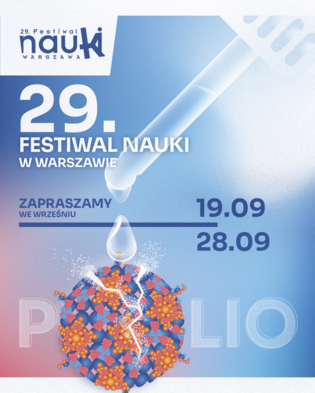29th Science Festival at the Faculty of Physics, University of Warsaw
2025-09-02
Do superconductors conduct super-current? What connects a sneeze, soap, and invisible creatures? Why is it so difficult to detect gravitational waves? What is it like to work in an analogue space base? How do scientists study works of art? – answers to these and many other questions can be found during lectures, workshops, and classes organized at the Faculty of Physics, University of Warsaw, as part of the 29th edition of the Science Festival in Warsaw. This year’s edition will also be highlighted by a unique popular science show “Particle Physics Show”, prepared by students and researchers from the University of Bonn.
The 29th Science Festival in Warsaw will take place from September 19 to 28, and its theme refers to the work of this year’s patron, Prof. Hilary Koprowski, creator of the first effective vaccine against the polio virus (the cause of poliomyelitis).
The festival program covers the natural sciences, medicine, humanities, social sciences, as well as culture and the arts. Events include debates, lectures, workshops, film screenings, lab visits, exhibitions, excursions, competitions, and educational games. We especially encourage you to join the activities hosted at the Faculty of Physics, University of Warsaw.
On September 23 at 6:00 PM, our Faculty will host a festival lecture from the “Ask a Physicist” series. This year, it will be the spectacular “Particle Physics Show”, extraordinarily combining theatre and science. Two young heroes embark on a fascinating journey through time to uncover the secrets of the origin of mass in particle physics. Along the way, they meet outstanding physicists in England (1910), America (1950), Germany (1980), and finally travel to CERN in Geneva (2012), where they witness the historic discovery of the Higgs boson at the Large Hadron Collider (LHC). The performance features 25 live physics experiments, demonstrated and explained on stage.
Do superconductors conduct supercurrent? What connects a sneeze, soap, and invisible creatures? Why is it so difficult to detect gravitational waves? What is it like to work in an analogue space base? How do scientists study works of art? – answers to these and many other questions will also be provided during the Science Day on September 27, 2025. On that day, festival participants will attend inspiring lectures, take part in workshops, and explore scientific laboratories usually closed to the public, including the Fluid Mechanics Laboratory of the Atmospheric Physics Division at the Faculty of Physics. Visitors will see demonstrations of a cloud chamber and a wind tunnel.
In the Demonstration Zone, participants will join first aid classes, see a prototype Mars rover and a CanSat competition probe, and learn about the work of analogue astronauts. The program also features the highly popular annual excursion to the UW Astronomical Observatory in Ostrowik, where visitors will listen to astronomy lectures, observe the night sky through telescopes, and relax by a campfire.
For young science enthusiasts, the Faculty of Physics has prepared shows and workshops in physics, chemistry, mathematics, and healthy nutrition. Children will try to solve the “travelling salesman problem,” embark on a journey into the microworld to discover the secrets of germs and invisible science, or build a protein model out of beads. They will also learn about the “good” and “bad” microbes found in food.
Our Faculty will also host three of the Festival’s six main debates:
September 26 (Friday), 6:00 PM – “Do quantum technologies have a real impact on our lives?” The UN has declared 2025 the International Year of Quantum Science and Technology. Experts from academia and industry will discuss the current state, challenges, and risks of the quantum revolution. Panelists include Dr. hab. Barbara Piętka, Prof. UW (Faculty of Physics), Dr. Anna Kamińska (FUW alumna, Director of Quantum Systems, Creotech Instruments S.A.), and Prof. Teodor Buchner. Moderator: Prof. Andrzej Wysmołek (Faculty of Physics).
September 27 (Saturday), 5:00 PM – “A Good Farewell”, a debate addressing the deeply difficult subject of death. Panelists: Dr. Barbara Czerska, Dr. Hanna Tchórzewska, and Dr. Zuzanna Toeplitz. Moderator: Prof. Andrzej Ziemba.
September 28 (Sunday), 5:00 PM – “Altered States of Consciousness. A Few Words About Psychedelics”. Experts will explore questions such as: What are the roots of the psychedelic renaissance? How do psychedelics affect the mind, social relations, and culture? Could they be a remedy for loneliness? Panelists: Prof. Joanna Jurewicz, Dr. Jan Szczypiński, and Maciej Lorenc, M.A. Moderator: [TBA].
All debates will be held in the Faculty’s main auditorium (Room 0.03).
From September 22 to 26, 2025, festival classes for primary and secondary school students will also take place at the Faculty of Physics.
The events are organized by staff and students of the Faculty of Physics, together with partners from the UW Faculty of Medicine, the Faculty of Mathematics, Informatics and Mechanics, the Centre of New Technologies, the National Centre for Nuclear Research, the Faculty of Conservation and Restoration of Works of Art at the Academy of Fine Arts in Warsaw, and the Institute of Human Nutrition Sciences at the Warsaw University of Life Sciences.
Some workshops and excursions on Science Day require registration. Sign-ups open on September 15, 2025 via: festiwal.fuw@gmail.com. Subject to availability, registration will also be possible on-site at the Festival reception desk.
Detailed program descriptions and registration details are available at: https://festiwalnauki.edu.pl/
CONTACT:
Agnieszka Fiedorowicz
Coordinator of the 29th Science Festival at the Faculty of Physics, UW
agnieszka.fiedorowicz@fuw.edu.pl
+48 22 55 32 518






